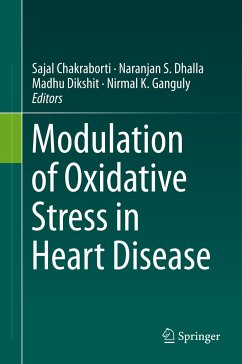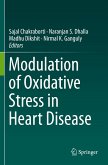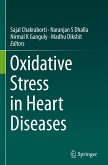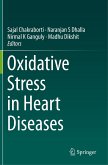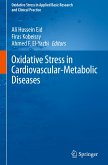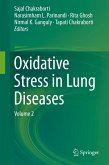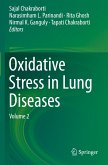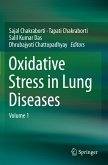Modulation of Oxidative Stress in Heart Disease
Herausgegeben:Chakraborti, Sajal; Dhalla, Naranjan S; Dikshit, Madhu; Ganguly, Nirmal K
Modulation of Oxidative Stress in Heart Disease
Herausgegeben:Chakraborti, Sajal; Dhalla, Naranjan S; Dikshit, Madhu; Ganguly, Nirmal K
- Gebundenes Buch
- Merkliste
- Auf die Merkliste
- Bewerten Bewerten
- Teilen
- Produkt teilen
- Produkterinnerung
- Produkterinnerung
This book highlights the multifaceted roles of Reactive Oxygen Species (ROS) in modulating normal cellular and molecular mechanisms during the development of different types of heart disease. Each chapter in the book deals with the role that altered redox homeostasis plays in the pathophysiology of heart disease. In addition, the book explains how reactive oxidant species interact with their targets and provides novel strategies for attenuating oxidative stress-induced types of heart disease.
The book not only covers ROS-induced response in heart disease at the cellular level, but also…mehr
Andere Kunden interessierten sich auch für
![Modulation of Oxidative Stress in Heart Disease Modulation of Oxidative Stress in Heart Disease]() Modulation of Oxidative Stress in Heart Disease149,99 €
Modulation of Oxidative Stress in Heart Disease149,99 €![Oxidative Stress in Heart Diseases Oxidative Stress in Heart Diseases]() Oxidative Stress in Heart Diseases187,99 €
Oxidative Stress in Heart Diseases187,99 €![Oxidative Stress in Heart Diseases Oxidative Stress in Heart Diseases]() Oxidative Stress in Heart Diseases187,99 €
Oxidative Stress in Heart Diseases187,99 €![Oxidative Stress in Cardiovascular-Metabolic Diseases Oxidative Stress in Cardiovascular-Metabolic Diseases]() Oxidative Stress in Cardiovascular-Metabolic Diseases139,99 €
Oxidative Stress in Cardiovascular-Metabolic Diseases139,99 €![Oxidative Stress in Lung Diseases Oxidative Stress in Lung Diseases]() Oxidative Stress in Lung Diseases149,99 €
Oxidative Stress in Lung Diseases149,99 €![Oxidative Stress in Lung Diseases Oxidative Stress in Lung Diseases]() Oxidative Stress in Lung Diseases149,99 €
Oxidative Stress in Lung Diseases149,99 €![Oxidative Stress in Lung Diseases Oxidative Stress in Lung Diseases]() Oxidative Stress in Lung Diseases149,99 €
Oxidative Stress in Lung Diseases149,99 €-
-
-
This book highlights the multifaceted roles of Reactive Oxygen Species (ROS) in modulating normal cellular and molecular mechanisms during the development of different types of heart disease. Each chapter in the book deals with the role that altered redox homeostasis plays in the pathophysiology of heart disease. In addition, the book explains how reactive oxidant species interact with their targets and provides novel strategies for attenuating oxidative stress-induced types of heart disease.
The book not only covers ROS-induced response in heart disease at the cellular level, but also demonstrates that an imbalance of redox states has its roots in our genes, and explains the ways gene expression is regulated. In turn, it reviews potential sources of ROS, their pathological effects on the heart, and potential sites for therapeutic interventions.
The book not only covers ROS-induced response in heart disease at the cellular level, but also demonstrates that an imbalance of redox states has its roots in our genes, and explains the ways gene expression is regulated. In turn, it reviews potential sources of ROS, their pathological effects on the heart, and potential sites for therapeutic interventions.
Produktdetails
- Produktdetails
- Verlag: Springer / Springer Nature Singapore / Springer, Berlin
- Artikelnr. des Verlages: 978-981-13-8945-0
- 1st edition 2019
- Seitenzahl: 704
- Erscheinungstermin: 14. Februar 2020
- Englisch
- Abmessung: 241mm x 160mm x 43mm
- Gewicht: 1141g
- ISBN-13: 9789811389450
- ISBN-10: 9811389454
- Artikelnr.: 56544139
- Herstellerkennzeichnung Die Herstellerinformationen sind derzeit nicht verfügbar.
- Verlag: Springer / Springer Nature Singapore / Springer, Berlin
- Artikelnr. des Verlages: 978-981-13-8945-0
- 1st edition 2019
- Seitenzahl: 704
- Erscheinungstermin: 14. Februar 2020
- Englisch
- Abmessung: 241mm x 160mm x 43mm
- Gewicht: 1141g
- ISBN-13: 9789811389450
- ISBN-10: 9811389454
- Artikelnr.: 56544139
- Herstellerkennzeichnung Die Herstellerinformationen sind derzeit nicht verfügbar.
Dr Sajal Chakraborti is a Professor of Biochemistry at the University of Kalyani, West Bengal, India. He completed his PhD at Calcutta University, Kolkata, India and his DSc at the University of Kalyani. He also pursued postdoctoral research at Johns Hopkins University, Baltimore; University of Utah, Salt Lake City; and New York Medical College, New York as a Fulbright Fellow. He visited the University of Florida, Gainesville, Florida, where he conducted research on f beta-adrenergic receptor activation in heart disease. His research mainly deals with the role of vasoactive agents in regulating vascular tone under oxidant and calcium signaling phenomena. He has been engaged in biochemistry teaching and research for the past 40 years (email: saj_chakra@rediffmail.com). Dr Naranjan S Dhalla is a Distinguished Professor at the University of Manitoba, Winnipeg, Canada. His expertise includes the subcellular and molecular basis of heart function inhealth and disease. He has been engaged in multidisciplinary cardiology research and education for over 50 years. He is currently the Editor-in-chief of Molecular and Cellular Biochemistry (Springer) (email: NSDhalla@sbrc.ca). Dr Madhu Dixit is a National Chair Fellow of the Translational Health Science and Technology Institute, Faridabad, Haryana, India. She has contributed to the general area of biochemical pharmacology with a special interest in cardiovascular pharmacology and redox biology. Dr Dixit has been engaged in research, especially on drug discovery and development, for over 40 years (email: rmadhudikshit@gmail.com). Dr Nirmal K Ganguly, a distinguished biotechnologist and former Director General of the Indian Council of Medical Research (ICMR), is associated with Global Health Strategies, New Delhi, India. One important aspect of his research is the understanding of occupational, environmental and nutritional aspectsof heart disease. In 2008 he was presented with the Padma Bhushan Award in the field of "Medicine" by the President of India (email: ganguly1nk@gmail.com).
- Part I Regulation of Oxidative Stress. - Modulation of Oxidative Stress in Heart Disease by Uncoupling Proteins. - Oxidant-Dependent and Oxidant-Independent Proangiogenic and Vasomotor Signaling in Coronary Vascular Endothelium. - Modulation of miRNA in Oxidative Stress-Induced Cardiac Remodeling. - Myocardial Oxidative Stress and Metabolic Diseases. - Impact of Genetic and Epigenetic Factors on the Oxidative Stress in Cardiovascular Disease. - Role of Monoamine Oxidases in Heart Diseases. - Key Cellular Effectors in ROS-Mediated Cardiac Diseases. - Reactive Oxygen Species Generation in Neutrophils: Modulation by Nitric Oxide. - Heat Shock Proteins and Their Associated Oxidative Stress-Induced Heart Disease. - Modulation of Oxidative Stress in Cardiovascular Diseases. - Part II Pathophysiology of Oxidative Stress. - Oxidative Stress and Heart Failure. - Oxidative Stress in Metabolic Syndrome: Experimental Model of Biomarkers. - Oxidative Stress as a Critical Determinant of Adult Cardiac Progenitor Cell-Fate Decisions. Role of Oxidative Stress in Hyperhomocysteinemia-Induced Heart Diseases. - Nitrosative Stress and Cardiogenesis: Cardiac Remodelling Perturbs Embryonic Metabolome. - Oxidative Stress in Pulmonary Artery Hypertension. - Free Radicals and Reactive Oxygen Species in Cardiovascular Pathophysiology: An Overview. - Epigenetic Basis of Oxidative Stress in Diabetic Coronary Atherosclerosis: A Shift in Focus from Genetic Prerogative. - Role of Oxidative Stress, Mitochondrial Dysfunction, and Autophagy in Cardiovascular Disease: Its Pathogenesis and Amelioration by Different Small Natural Molecules. - Parkin Protein: The Missing Link Between Cardiovascular and Parkinson's Disease. - Part III Prevention and Therapeutics. - New Technologies in Drug Development Provide New Hope in Targeting of Dysregulated Redox Signalling in Cardiovascular Disease. - An Exercise Mimetic That Targets Nitroso-Redox Balance as a Therapeutic for Heart Disease. - Myocardial Injury Secondary to Intestinal Ischemia/Reperfusion or Microbiota Disturbance: Preventive and Therapeutic Concerns. - Multi-target Approach for Oxidative Stress Modulation by Aspirin, Salicylates and Other NSAIDs: Clinical Implications in Atherosclerosis. - The Evolving Concept of Mitochondrial Dynamics in Heart: Interventional Opportunities. - Pharmacogenetic Implications of Statin Therapy on Oxidative Stress in Coronary Artery Disease. - Basic Mechanisms of Ischemia/Reperfusion Injury Leading to Cellular and Tissue Damage: Therapeutic Implications. - Targeting Mitochondria for Therapy of Cardiovascular Disease.
- Part I Regulation of Oxidative Stress. - Modulation of Oxidative Stress in Heart Disease by Uncoupling Proteins. - Oxidant-Dependent and Oxidant-Independent Proangiogenic and Vasomotor Signaling in Coronary Vascular Endothelium. - Modulation of miRNA in Oxidative Stress-Induced Cardiac Remodeling. - Myocardial Oxidative Stress and Metabolic Diseases. - Impact of Genetic and Epigenetic Factors on the Oxidative Stress in Cardiovascular Disease. - Role of Monoamine Oxidases in Heart Diseases. - Key Cellular Effectors in ROS-Mediated Cardiac Diseases. - Reactive Oxygen Species Generation in Neutrophils: Modulation by Nitric Oxide. - Heat Shock Proteins and Their Associated Oxidative Stress-Induced Heart Disease. - Modulation of Oxidative Stress in Cardiovascular Diseases. - Part II Pathophysiology of Oxidative Stress. - Oxidative Stress and Heart Failure. - Oxidative Stress in Metabolic Syndrome: Experimental Model of Biomarkers. - Oxidative Stress as a Critical Determinant of Adult Cardiac Progenitor Cell-Fate Decisions. Role of Oxidative Stress in Hyperhomocysteinemia-Induced Heart Diseases. - Nitrosative Stress and Cardiogenesis: Cardiac Remodelling Perturbs Embryonic Metabolome. - Oxidative Stress in Pulmonary Artery Hypertension. - Free Radicals and Reactive Oxygen Species in Cardiovascular Pathophysiology: An Overview. - Epigenetic Basis of Oxidative Stress in Diabetic Coronary Atherosclerosis: A Shift in Focus from Genetic Prerogative. - Role of Oxidative Stress, Mitochondrial Dysfunction, and Autophagy in Cardiovascular Disease: Its Pathogenesis and Amelioration by Different Small Natural Molecules. - Parkin Protein: The Missing Link Between Cardiovascular and Parkinson's Disease. - Part III Prevention and Therapeutics. - New Technologies in Drug Development Provide New Hope in Targeting of Dysregulated Redox Signalling in Cardiovascular Disease. - An Exercise Mimetic That Targets Nitroso-Redox Balance as a Therapeutic for Heart Disease. - Myocardial Injury Secondary to Intestinal Ischemia/Reperfusion or Microbiota Disturbance: Preventive and Therapeutic Concerns. - Multi-target Approach for Oxidative Stress Modulation by Aspirin, Salicylates and Other NSAIDs: Clinical Implications in Atherosclerosis. - The Evolving Concept of Mitochondrial Dynamics in Heart: Interventional Opportunities. - Pharmacogenetic Implications of Statin Therapy on Oxidative Stress in Coronary Artery Disease. - Basic Mechanisms of Ischemia/Reperfusion Injury Leading to Cellular and Tissue Damage: Therapeutic Implications. - Targeting Mitochondria for Therapy of Cardiovascular Disease.

